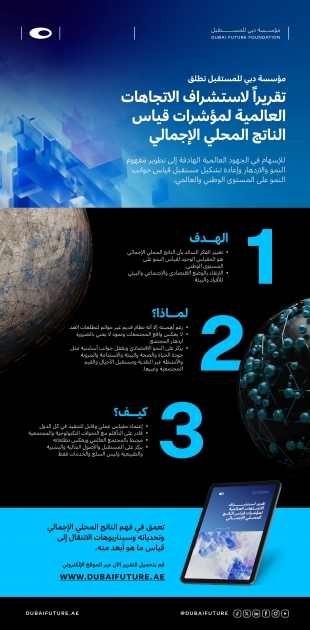
Dubai Future Foundation launches ‘The Future of Progress’ report rethinking national success
Dubai Future Foundation (DFF) today published a report titled “The Future of Progress”, making the case for a new global measurement of national success that goes beyond the traditional concept of gross domestic product (GDP).
DFF had previously raised the notion of new definitions of success in the Future Opportunities Report: The Global 50, launched earlier in 2023, delving deeper to enable a more nuanced and comprehensive conversation about the future measures of national progress. The new report explores possible scenarios and pathways for the transition beyond GDP as a foundation for global dialogue. The report aims to contribute to the many significant global efforts that have already been achieved as there is still no internationally agreed standard for moving beyond GDP.
GDP has been the primary indicator of national progress since it was first adopted nearly 80 years ago. It is based on the value of goods and services produced and consumed, savings and investments, government expenditure, tax revenue, and net exports. It is considered the global standard for determining national progress and development; but swift advances in technology and the emergence of global imperatives such as climate change and social development needs have exposed limitations in GDP as a measure of prosperity.
His Excellency Mohammad Abdullah Al Gergawi, Vice Chairman of the Board of Trustees and Managing Director of Dubai Future Foundation, stated that the rapid economic shifts seen across governments and nations today call for a rethink of the concept of GDP.
Al Gergawi said: “There is a growing need to expand the parameters of GDP to include broader indicators such as quality of life, education, health, employment, well-being, research and innovation, safety, energy, sustainability, among others.”
He added: "This report aims to launch a global dialogue on a highly promising opportunity to develop new frameworks for evaluating national growth and economic progress. By working with governments and international organisations, we can explore a range of recommendations and future scenarios that incorporate new indicators beyond the traditional GDP measure."
The Future of Progress report analyses the barriers to moving beyond GDP, presents a roadmap for the global transition beyond GDP, offers global recommendations, and highlights future scenarios to establish a unified global narrative on moving beyond GDP. The four scenarios are based on five main assumptions: the first assumption is that there will be no predetermined perspective on whether the future of ‘beyond GDP’ will include GDP.
The second is that progress measurement and reporting will remain a national priority. The third is that the global transition beyond GDP will have at least two tiers: global, national and possibly – in some contexts – regional. The fourth assumption is that some dimensions will differ across contexts and will change over time, while the fifth is that technology – including AI and automation – will enable, and not hinder, the transition beyond GDP.
The four global recommendations outlined in the report include proposing a global definition for progress, establishing a global working group to co-design a preliminary framework for a new measure, agreeing principles of progress, and selecting pilot sites around the world to test, assess and refine each dimension.
As part of the research, the Dubai Future Foundation has covered 18 key country-level approaches to moving beyond GDP and 21 global indices looking at progress beyond the economy. In addition, DFF engaged with global experts, many of whom are part of significant efforts and initiatives on transitioning beyond GDP. These include experts from the United Nations Environment Programme, the International Institute for Sustainable Development, the United Nations Development Programme, the African Economic Research Consortium, Wellbeing Economic Alliance, the World Bank, the International Monetary Fund, University of Cambridge, Peking University, the University of Birmingham and the University College London amongst others.



























